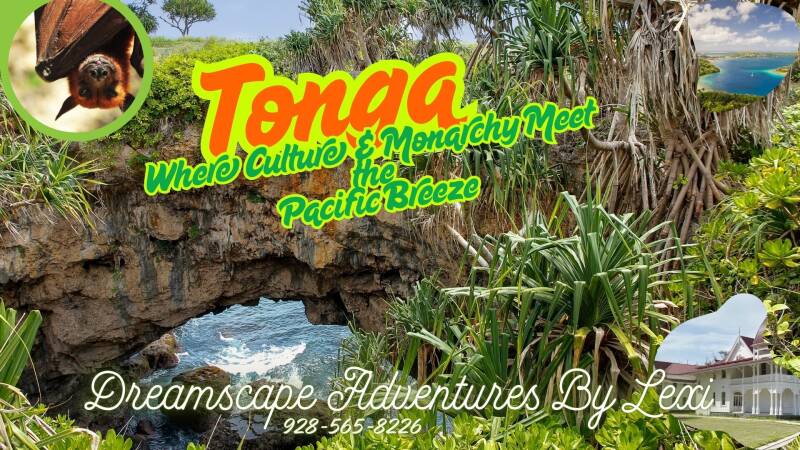
For travelers seeking more than just beautiful beaches and blue horizons, the Kingdom of Tonga offers something rare in today's world - a living cultural heritage, untouched by colonization, where tradition, monarchy, and community are the soul of everyday life.
Tucked away in the heart of the South Pacific, east of Fiji and south of Samoa, The Kingdom of Tonga is a captivating island nation, comprised of 171 islands, with only 45 inhabited. Spread over 700,000 square kilometers in the Pacific ocean, these islands are divided into four main groups: Tongatapu, Ha'apai, Vava'u, and the Niuas. Known as the "Friendly Islands", Tonga is one of the most culturally rich and historically unique countries in the world. Tonga is the only Pacific nation never to have been colonized, and it remains the region's last surviving indigenous constitutional monarchy.
The Tongan monarchy is deeply rooted in tradition and national identity. Despite political reforms in recent years, including the introduction of democratic elections, the monarchy still plays a pivotal role in both governance and cultural identity. The royal family is widely respected and continues to symbolize the unity and continuity of the Tongan people.
Culture, Tradition & a Slow, Sacred Rhythm:
Cultural travelers will find Tonga a treasure trove of experiences. Time moves differently in Tonga - and that's just part of its charm. Sundays are sacred. The entire country slows down in observance of church services in true Christian tradition. Shops close, beaches are empty, the smell of home cooking fills the air. For visitors , this is the perfect opportunity to pause and reflect - perhaps stroll through a quiet village or listen to distant church choirs carried by the wind.
Tonga's people are known for their hospitality and it is not uncommon to be invited to a family feast, where you get to sample lu pulu (corned beef and taro leaves slow-cooked in coconut cream), Taro and breadfruit, or 'ota ika (raw fish salad marinated in coconut cream and citrus).
At the heart of Tongan society is fa'a Tonga aka the Tongan Way, which emphasizes respect, generosity, and familial obligations. Cultural respect is essential. Dressing modestly, learning a few words of lea faka-Tonga, and observing local customs will not only enrich your trip but also show your appreciation for this resilient island nation and its people.
Whether you watch ceremonial dances like the lakalaka, tau'olunga, and soke, which are performed at important events, combining poetry, music, and choreographed dance to express social values and storytelling, or join a village kava ceremony, you'll witness cultural impressions that have remained unchanged for centuries.
Cultural Etiquette:
Tonga is one of the most culturally conservative Pacific nations, and respectful behavior is key to a meaningful visit. Here are a few important customs to be aware of:
- Greet People: A simple "Malo elelei" (Hello) goes a long way in establishing goodwill and respect.
- Dress Modestly: Avoid revealing clothing, especially when visiting villages or churches. Women are advised to wear skirts or sarongs (locally known as tupenu), and men should avoid going shirtless in public.
- Sundays Are Sacred: As I have already mentioned, Tonga is deeply Christian, and Sunday is a day of rest. Activities like loud music, swimming, and sports are strongly discouraged in public spaces.
- Ask Before Taking Photos: Especially, at cultural events or in villages, be polite and ask permission before photographing people or sacred sites.
- Remove Hats Indoors: When speaking to elders, entering homes, churches, or other public sites, and establishments always remove your hat.
Must-Experience Cultural Highlights
- Feasting and 'Umu (Earth Ovens): Feasts are a cornerstone of Tongan Culture. Food is often cooked in an "umu - a traditional earth oven, lined with hot stones.
- Kava Ceremonies: Participating in a kava ceremony is a truly unique cultural experience. This traditional drink is made from the root of the kava plant and often shared in a formal or spiritual event, and during Kava nights aka faikava. Kava nights are common events in villages, offering you a chance to listen to local music, stories, and debates, while sipping on your kava.
When to Visit: Cultural Festivals
- Heilala Festival (July): This week-long festival celebrating the king's birthday, features parades, traditional dances, sports, and a Miss Heilala beauty pageant that emphasizes culture and grace.
- Royal Birthday Celebrations: The king's birthday and coronation anniversaries are marked by official ceremonies, church services, and large public events. If you time it right, these celebrations can offer a rare insight into royal traditions.
- Vava'u Whale Festival (Augusts): Although focused on promoting eco-tourism, this festival includes cultural showcases, music, and dance, making it a great time to explore both, marine life and local traditions.
Beyond the Culture: Nature's Canvas
While the cultural depth of Tonga is reason enough to visit, Tonga's natural beauty is breathtaking. July through October is the perfect time to swim with humpback whales in Vava'u, explore underwater limestone caves, snorkel reefs off Ha'apai's untouched beaches, or look for the endangered Flying Fox.
Yet even in these wild places, culture is never far away. Local guides often weave legends and ancestral stories into your adventures - reminders that Tonga's landscapes are not just scenic backdrops, but meaningful sacred places
.
In a world rushing toward modernization and space exploration, Tonga stands proudly anchored in tradition. It's a destination for travelers seeking authenticity, respect, and a deeper connection to people and place. Here, the monarchy goes beyond history - it's living. Culture is not a performance - it's everyday life. For those willing to slow down and listen, Tonga offers one of the most rewarding cultural journeys in the Pacific. In Tonga, you don't just visit - you participate. And long after you will have left, the rhythm of fa'a Tonga may still echo in the way you see the world.
HAPPY TRAVELS


Add comment
Comments